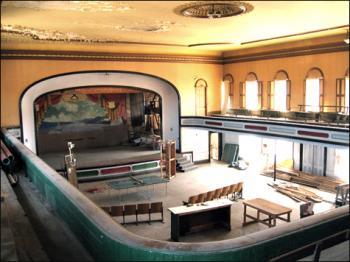Belfast Opera House makes Maine Preservation’s ‘Most Endangered Properties’ list
BELFAST - Maine Preservation last month released its list of Most Endangered Historic Properties. Among the eight entries were all of downtown Gardiner, a pair of clock towers in Biddeford, a drive-in theater in Skowhegan, several homes, a rural town office and the Belfast Opera House.
The Opera House is not a property unto itself, but it occupies much of the upper three stories of the Hayford Block in the city’s commercial downtown. The rest of the block consists of over a dozen storefronts, professional offices and apartments. As the preservation group noted, these spaces are mostly full and thriving.
But inside the massive function hall it’s a different story.
“The large space is in serious disrepair and is underutilized because of its deterioration,” Maine Preservation wrote in a short summary of why the Opera House made the list. “It lacks seating and the equipment it needs to be made usable as a working theater or production space once more.”
Originally called “Hayford Hall,” after Belfast mayor and businessman Axel Hayford, the Opera House has been used plays, meetings, public events, and dances. The floor in front of the stage was large enough for basketball games and boxing matches, and a wraparound balcony brought the seating capacity of 1,300, according to Maine Preservation. The abolitionist and reformer Frederick Douglass spoke there during a visit to Belfast. The main floor was used as an armory and the attic served a makeshift shooting range. There was roller skating.
According to a Facebook page for the building, the hall hosted several small film shoots earlier this year. For much of the past three decades use has been similarly sporadic. Belfast residents have borne witness to many well-publicized attempts to revive the space over the past 20-plus years. But all have fallen short for one reason or another.
Maine Preservation’s Executive Director Greg Paxton said the organization sees the inclusion of the Belfast Opera House on the 2014 Most Endangered list as “a positive.”
“Our purpose really is to lay out a set of issues that we would like to help get resolved,” he said. “The history has been that many of the buildings on the list have been preserved.” Five hundred of them since 2009, he said.
Paxton said there was not a particular change in the property that prompted the Belfast Opera House to be picked for this year’s list. He added that the organization offers field services like assessments of buildings, advice on ways to handle rehabilitate them and take advantage of tax credits for historic properties.
Building owners Cara Guerrieri and Francis Owen did not respond to numerous messages left by Penbaypilot.com seeking comment.
In a short paragraph labeled “The Solution,” Maine Preservation said the Belfast Opera House needs “a community effort with donations and sponsorships” in the spirit of opera house restorations in Waterville and Boothbay.
“A preservation-based rehabilitation could allow the space to once again serve as a community center for performing and visual arts within the town of Belfast. The Opera House could also work as an event space for weddings, conferences, educations events, etc.”
Maybe, but this is not Belfast’s first opera rodeo.
Many grand plans, grassroots campaigns and other expressions of a collective desire to restore the space have come and gone since the 1980s. The most recent public effort, initiated by the city and later handed off to a citizen group, gave brief consideration to the Opera House among other spaces, including the former Crosby High School building and Mathews Bros. Spring Street showroom, as potential locations for a performing arts and event center.
City Councilor and former mayor Mike Hurley has been involved in attempts to revive the Opera House for three decades. He said the major obstacle has always been money.
“There are people who say, ‘The Opera House, you cant do it,’ But all it takes is one person who gets excited about it who’s a true believer — just like you had with Matt Simmons in Rockland with the Strand Theatre — and away you go," he said.
Simmons brought a vast personal fortune to the Strand renovation, but Hurley echoed Maine Preservation’s view that it might not take an angel investor.
"I could easily imagine the Opera House happening with community support,” he said. “It needs a green room, it needs a bathroom, it needs an elevator. But can it be done? Yeah. Lots of places have these things."
On a visit to Provincetown, Mass. last summer, Hurley sent back photos of a strikingly similar function hall there and asked where people thought it was. Plenty said the Belfast Opera House. Hurley was quick to acknowledge that Provincetown is not Belfast, but he emphasized that the town invested in the project at the same time Belfast was deciding not to put money into an event center.
In the midst of a recession when everyone was saying we're broke don't do it. They did it,” he said. “And now they have that.”
The Opera House is one of a number of 19th century function halls on the upper stories of downtown buildings, including the grand hall in the Masonic Building, the old Odd Fellows hall and the former “city hall” on the top floor of City Block, at the corner of Main and High Streets. Once hubs of community activity, all are now either vacant or used privately by the property owners.
Ethan Andrews can be reached at news@penbaypilot.com


























